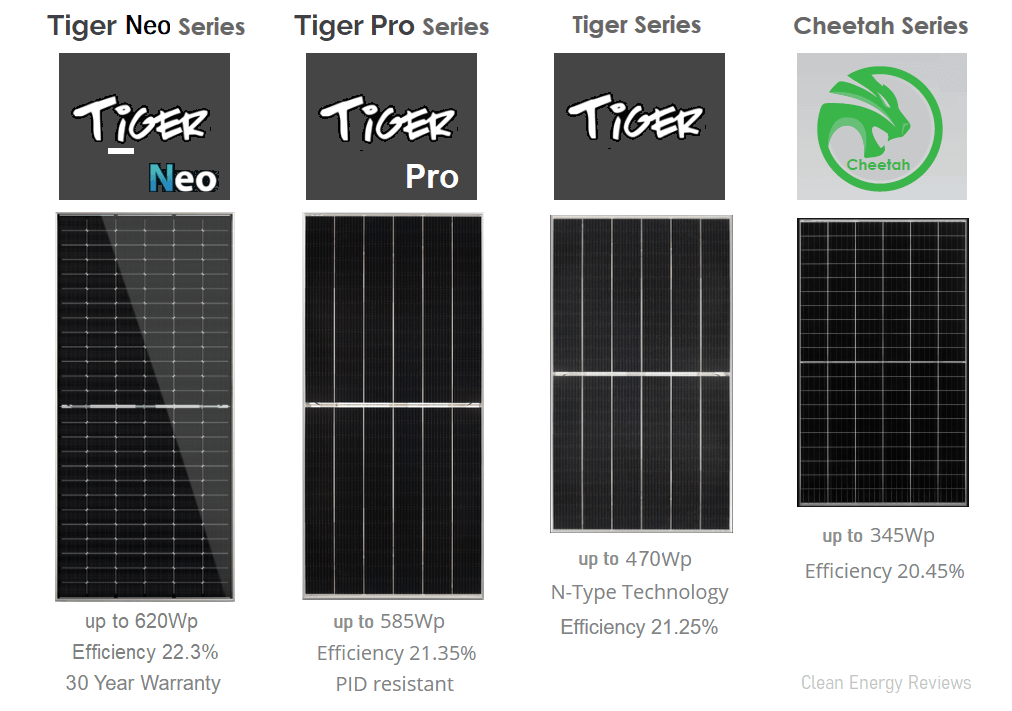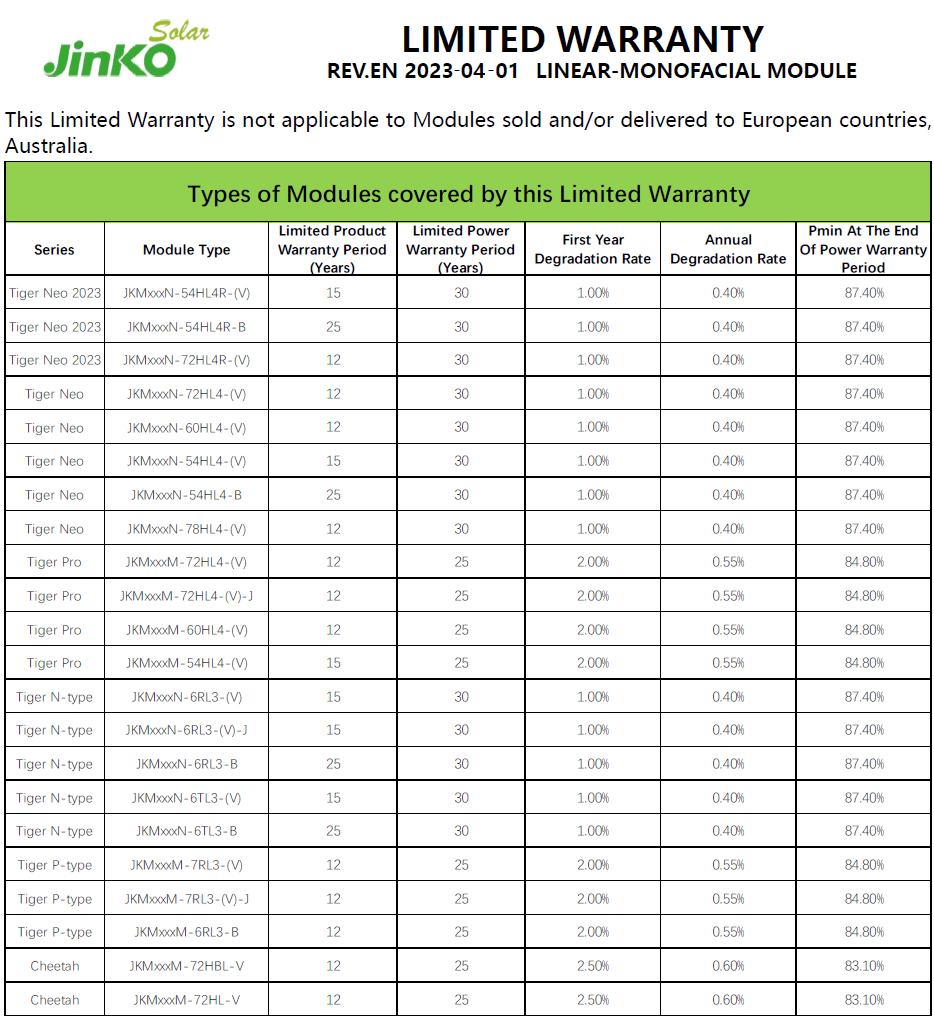Jinko Solar Panels Review
home > solar panels > best solar panels review > Jinko Solar Panels Review
Jinko Solar Panels Overview
Jinko Solar is currently the world’s largest solar panel manufacturer and has a sound track record for producing cost-effective, reliable solar panels for residential and commercial applications. On the back of several record-breaking solar cell efficiency records and innovations, Jinko Solar has emerged as one of the industry leaders in research and development. The company is now leading the transition to cost-effective, high-performance N-type cells with the flagship Tiger NEO series panels.
Jinko Solar Panels Quick Summary
Power rating (W): 370W - 635W
Efficiency (%): Very High - 20.6% - 23.2%
Cell technology: P-type, N-type, TOPCon
Price bracket: Low-Med $$$
Most popular panel: Tiger Neo 440W
Product Warranty: Very Good - 12, 15, 20, or 25 years
Service and support: Very good 4/5
Overall: Recommended ☆☆☆☆☆
Company History
Jinko Solar was founded in 2006 and became the world’s largest solar panel manufacturer only a decade later, in 2016. The company has held the top stop for the last six years, with global shipments of 14.3 GW in 2019 alone. Based in China, Jinko Solar is a huge multi-national, vertically integrated company, employing over 15,000 people in 70 countries and establishing manufacturing facilities in China, Malaysia and the US.
Jinko Solar’s success seems primarily due to the focus on R&D, performance testing, quality control and rigorous durability testing. This is highlighted by the numerous record-breaking achievements over the years, with several efficiency records and consistent ‘top score’ results from several independent testing companies, including the well-known PVEL scorecards. Until recently, Jinko Solar was generally not at the forefront of innovation and usually played it safe by only deploying panels using proven cell architectures such as traditional P-type PERC and half-cut cells. However, Jinko has started pushing the boundaries with the release of the Tiger NEO series panels described in more detail below.
Jinko Solar Panel Range
Like most large PV manufacturers, Jinko offers a range of solar panels designed for residential, commercial, or utility-scale installations. They can also tailor panel designs and formats to suit specific applications if required for larger MW scale systems. The Jinko panel range comprises the following:
Cheetah - Compact, simple, budget panels
Tiger - Compact, mid to high-performance panels
Tiger Pro - Large, mid to high-performance panels
Tiger Neo - High-performance panels for residential, commercial and utility-scale systems
Solar installers typically describe Jinko Solar as providing good entry-level, cost-effective panels. Like most competing manufacturers, Jinko produces panels based on regular mono PERC cells using P-type silicon. However, more recently, Jinko pushed into the high-performance category by releasing the Tiger series built on high-purity N-type cells. Traditionally, only the premium panel manufacturers, including SunPower, Panasonic and REC, built panels based on N-type cells, but over the last two years, most manufacturers, including Jinko and Trina Solar, have developed cost-effective N-type cell manufacturing methods to boost panel efficiency.
Benefits of N-Type cells compared to traditional P-Type cells
Increased efficiency
Lower rate of degradation (only 0.4% per year)
Better high-temperature performance
Improved performance warranty
Cheetah series
The Cheetah range of panels were the first in the series named after big cats, following on from the obsolete Eagle series. First released back in 2018, the Cheetah panels are available in a range of sizes from 325W to 340W, in both the standard 60 (or 120 half-cut) cell residential size, or up to 410W in the larger format commercial size. Figures from Formbay, showed the Cheetah panels were the top-selling panel in Australia during 2020, specifically the JKM330M-60H model. Jinko Cheetah panels were well regarded by most installers we surveyed due to providing a good combination of quality and value for money. However, several installers noted frames were not always perfectly square and some glass colour mismatch (a visual discrepancy only).
Jinko expanded the Cheetah range in 2020 to include a new slightly larger 66 cell (132 half-cut) panel with increased efficiency and greater power output ranging from 360W to 380W. This new mid-size 370W panel variety has become a new industry standard and will possibly replace the traditional 60 cell (120 cell) format in the near future.
Tiger series panels
The higher performance Tiger series are rated from 370W up to 470W and feature many of the latest innovations in PV cell technology including larger size cells, multi-busbar (MBB) with 9 thin wire busbars (as opposed to traditional flat ribbon busbars) and what Jinko has termed ‘Tiling Ribbon’ or TR for short. Tiling ribbon is a manufacturing technique where the cells are slightly overlapped, much like shingled cells, to eliminate the gap between the cells and increase overall surface area which in-turn increases efficiency. To achieve this, Jinko uses a unique pressing process to join the thin wire busbars together. This has the added benefit of reducing costs, and almost eliminating the need for soldering which can contain traces of lead. The overall result of these clever innovations is higher performance, improved reliability, and of course, increased efficiency.
TIGER PANEL KEY FEATURES
High-purity N-Type cells
TR - high-density cell technology
9BB - Nine Busbars
20 Year Product Warranty
30 Year Performance Warranty
Cells used in the new Tiger series feature Tiling ribbon cell interconnections with 9 MBB wires.
Tiger Pro Series
The second iteration in the Tiger series was the Tiger Pro panels which debuted in 2020 with a record-breaking power rating of up to 580W. Shortly after, at the SNEC PV Power Expo in China, JinkoSolar unveiled a 610W version of the Tiger Pro panel, making it one of the most powerful panels on the market. The initial release was 530W and built up to 580W, followed by 600W+ as the production volume and cell efficiency increased which is a common practice by most manufacturers.
Tiger Pro panels are now available in a wide range of sizes to suit all applications, from the compact 54-cell 400W panels, to the large-format Tiger Pro panels available up to 550W. The Tiger Pro range is built on the larger 182mm cell format and features a 9 MBB Tiling Ribbon (TR) cell design using a high-purity N-type silicon cell base to achieve up to 21.6% efficiency. The MBB cell design also results in a lower temperature coefficient of -0.35%/°C.
Tiger Neo Series
The Tiger Neo series is the latest iteration in Jinko's range of panels, built on high-performance TOPCon cell technology. TOPCon cells are made using high-purity N-type cells and are slowly emerging as the new industry standard due to the increased efficiency compared to regular Mono PERC cells made using a P-type substrate. The Neo panels range from the mid-size 440W panel to the much larger, high-power 635W panels designed for large-scale solar farms. Thanks to recent innovations, maximum efficiency now comes at a record-breaking 23.2% thanks to the high-density cell format and next-generation high-performance N-type TOPCon cells. The NEO series is available in various sizes for different applications, including 54, 60, 72, and 78-cell formats.
Other impressive highlights of the TOPCon cell technology include a high bifacial factor to improve bifacial performance (absorption of reflected light on the back-side of the panel), minimal LID and very low LeTID degradation, an improved 30-year warranty, and a lower temperature coefficient of -0.30% to minimise losses in high-temperature environments. The Neo series is available in two bifacial varieties with either 72 or 78-cell configurations for large-scale ground-mounted solar arrays.
Tiger Neo solar panel key specifications
Confusing Warranties
The Jinko warranty details are some of the most confusing of any manufacturer. The product warranty period of the same module can vary by up to 10 years, depending on the region. The Tiger N-type series were the first from JinkoSolar to be backed by a 15 or 25-year product warranty and an extended 30-year performance warranty. Due to the lower rate of light-induced degradation (LID), the high-purity N-type panels are guaranteed to still operate at a minimum of 87.4% of the rated power after 30 years, which equates to a very low 0.4% loss per year of use.
In a rare move, the Tiger Neo product warranty released on the 11th Nov 2021 was reduced from 15 to 12 years. This is very unusual as most manufacturers, including Jinko, generally increase the product warranty period with the release of newer, more advanced modules. However, this reduction was reversed on the 29th of November in the same month.
The entry-level Tiger P-type panel performance warranty still promises a minimum of 83.1% after 25 years, which is reasonable considering the harsh environmental conditions solar panels are exposed to throughout the year. The Tiger P-type product warranty is 12 years. The older Cheetah series still maintain the standard 12-year product warranty and 25-year performance warranty, with 83.1% minimum power output with a maximum of 0.62% degradation per year.
2023 Warranty Update
On the 1st of April, Jinko released a new 2023 product warrant document that outlines the warranty period of all currently available modules. The product warranty period is 12 or 15 years for most Tiger N-type, NEO and Pro panels and 25 years for a few selected models. However, this new warranty document does not cover modules sold in Australia or Europe. For Australian customers, Jinko released a Special Limited Warranty document in late 2022, which specifies a unique 20-year limited product warranty period for most models sold in the region.
Sustainability
Making Solar Panels using Solar power
JinkoSolar have committed to source 100% of their electricity demand from renewables by 2025 as part of the RE100 initiative - “RE100 is the global corporate renewable energy initiative bringing together hundreds of large businesses who have committed to 100% renewable electricity.”
In addition to powering all of its facilities from renewables, Jinko also plans to locate all new factories close to regions with a high penetration of renewable energy. To help reach the goal of 100% renewable by 2025 Jinko will focus more R&D on developing higher efficiency solar panels and push to increase the use of recycled materials in its manufacturing processes. Plus efforts will be made to use the most energy efficient manufacturing technologies and reduce the use of lead based solder which is already being achieved through the unique TR cell interconnection being used on the current Jinko Tiger Pro panels.
Quality and Performance
Jinko Solar has a good track record for reliability based on our continuous feedback from solar installers and industry professionals. Like almost all manufacturer’s, Jinko has had some panel failures over the years, but they generally provide good service and will replace failed or very poor performing panels under warranty without too much fuss.
One of the world’s leading independent solar module testing and performance services PVEL, a German-based testing facility, produce the annual PV Module Reliability Scorecard Report. Jinko Solar has performed very well in the last five years of testing, achieving a ‘Top performer’ rating every year to be ranked as number 1 among the highest performing module’s in the group with no severe degradation or failures.
Summary of the top performers from PVEL - A leading independent solar panel testing service
The low failure rates could only be due to the stringent testing performed at Jinko Solar’s own UL certified module test facilities, and huge R&D test center which conducts advanced failure analysis. Another important area where Jinko claims to have gone above most competitors is in conducting ‘deep-dive due diligence’ on all material suppliers. This ensures they are receiving only the highest quality raw materials, plus all processes and supplier production facilities must meet the company requirements.
Jinko Battery Storage Systems
Jinko Solar has joined the ranks of several other well-known panel manufacturers, including Sunpower and Q Cells and released a range of energy storage systems. However, unlike the manufacturers mentioned above, which have focused on residential storage, Jinko has gone a step further and developed a wide range of energy storage systems, including large commercial and utility-scale systems. To achieve this, Jinko Solar has teamed up with a variety of established energy storage and inverters manufacturers and rebadged several well-known battery storage products under Jinko branding.
Jinko Suntank battery system
Due to the strict regulations and standards for different regions, Jinko offers a variety of residential battery systems depending on your country. For example, in Australia, Jinko offers the Suntank system, which is a rebranded Growatt SPH series hybrid inverter coupled with the Growatt LV modular battery system. While it is an affordable package, it is far from the longest-lasting or most reliable battery system due to being backed by a limited 5 + 5 years warranty with a lower than average lifespan offering only a minimum of 50% retained capacity after ten years. See the full Suntank battery warranty document.
Another battery storage system offered by Jinko is the 3-Phase JKS series built around the well-known Deye 12K hybrid inverter platform, available in a range of sizes from 7.2kWh up to 19.2kWh. Download the Jinko Deye system datasheet here. Compared to the Suntank, this is a more robust system built around a higher-performance inverter. All Jinko battery systems are built using lithium Ferro phosphate (LFP) cell technology which is safer and generally offers a longer cycle life than other lithium battery chemistries.
Summary
Jinko Solar did not become the world’s largest solar panel producer purely by luck. Until recently, the company didn’t focus on manufacturing the most efficient panels but mass-producing the most cost-effective and reliable panels built on tried and proven PV cell technologies. However, JinkoSolar’s emphasis on research and development is helping push the solar industry towards new high-performance cell technologies. The release of the Tiger N-type and Neo TOPCon panels featuring tiling ribbon technology highlights Jinko’s innovative manufacturing techniques to help increase efficiency while keeping costs down.
With Jinko Solar’s good track record and solid market position, they are certainly one of the better choices for reliable, cost-effective solar panels. In particular, the Tiger range of panels which have already proven to be a very popular choice for residential and commercial installations. However, one thing to be aware of is the product warranty details can be confusing as the warranty period can vary dramatically depending on the country or region.
On the battery storage front, JinkoSolar is a very new player, and it will take some time is establish itself in this rapidly growing space. That said, Jinko made a good move to build some of its energy storage systems around Deye hybrid inverters rather than starting from scratch. Deye Group has built power conversion equipment since 2007 and has a solid foundation. However, more recently, Jinko decided to re-badge a Growatt Hybrid inverter and LV modular battery system under the Suntank branding in some regions backed by, what I consider to be, an insufficient battery performance warranty.











